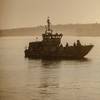Standards and recommended practices for dealing with stowaways have been adopted as amendments to the Convention on Facilitation of International Maritime Traffic (FAL Convention)Ships are to be thoroughly searched for stowaways on leaving high-risk ports and measures to prevent stowaways secreting themselves on board are to be tightened, following the adoption by the International Maritime Organization (IMO) of new international standards and recommended practices to deal with the problem.The new measures, which will be incorporated into the Convention on Facilitation of Maritime Traffic (FAL Convention), stipulate that Contracting Governments shall require ships entitled to fly their flag to undergo a thorough search in accordance with a specific plan or schedule when departing from a port where there is a risk that stowaways may have boarded. Passenger ships are to be exempted from the requirement.
The new measures also call upon public authorities, port authorities, shipowners and their representatives as well as shipmasters to cooperate in preventing stowaway incidents. Among other things, they specify the regular patrolling of port areas and the establishment of special storage facilities for cargo particularly susceptible to stowaway access, and continuous monitoring of persons and cargo entering these areas.
They also refer specifically to the problem of human smuggling, and call for co-operation between port authorities and other relevant authorities such as police, customs and immigration to combat the practice.
The new standards and recommendations include a list of minimum security arrangements that should be put in place by ships when calling at ports where there is a risk of stowaway embarkation. All doors, hatches and means of access to holds or stores which are not used during the ships stay in port should be locked, access points to the ship should be kept to a minimum and be adequately secured and areas seaward of the ship should be adequately secured. Adequate deck watch should be kept, boardings and disembarkations should, where possible, be tallied by the ships crew or others and adequate means of communication should be maintained. At night, adequate lighting should be maintained both inside and along the hull.
Although the new standards are aimed at tightening security around ships, they nevertheless recognize and reinforce the right of stowaways that do slip through the net to fair and humane treatment. They state that Contracting Governments shall require masters of ships entitled to fly their flag to take appropriate measures to ensure the security, general health, welfare and safety of any stowaway while on board, including providing him or her with adequate provisioning, accommodation, proper medical attention and sanitary facilities.
Disembarkation of stowaways
On the question of disembarkation, the new measures state that public authorities shall urge all shipowners operating ships entitled to fly their flag to instruct their masters not to deviate from the planned voyage to seek the disembarkation of stowaways discovered on board the ship after it has left the territorial waters of the country where the stowaways embarked, unless permission to disembark the stowaway has been granted by the public authorities of the State to whose port the ship deviates or repatriation has been arranged elsewhere with sufficient documentation and permission for disembarkation, or if there are extenuating security, health or compassionate reasons.
It is also stipulated that stowaways found inadmissible in the country of disembarkation should be returned from their point of disembarkation to the country where they boarded the vessel. The public authorities of the State of embarkation shall not return such stowaways to the country where they were earlier found to be inadmissible. When a port State has refused disembarkation of a stowaway that State should, without undue delay, notify the Flag State of the ship carrying the stowaway of the reasons for refusing disembarkation.
The formalities for dealing with stowaways will be incorporated into the Convention on Facilitation of International Maritime Traffic (FAL Convention), following their adoption during the 29th session of IMO’s Facilitation Committee, which met from January 7 to 11, 2002. The amendments to the FAL Convention are expected to enter into force on May 1, 2003.
The FAL Convention was adopted in 1965 to prevent unnecessary delays in maritime traffic, to aid cooperation between Governments, and to secure the highest practicable degree of uniformity in formalities and other procedures.
In the FAL Convention, standards are internationally-agreed measures which are “necessary and practicable in order to facilitate international maritime traffic” and recommended practices as measures the application of which is “desirable”.
The standards and recommended practices for stowaways reflect the Guidelines on the Allocation of Responsibilities to Seek the Successful Resolution of Stowaway Cases (Resolution A.871 (20)), adopted by IMO in 1997, which established basic principles to be applied in dealing with stowaways.
The FAL Convention amendments include a standard form to record stowaway details and states that public authorities should report all stowaway incidents to the Secretary General of the International Maritime Organization.
The FAL Convention provides that any Contracting Government which finds it impracticable to comply with any international standard, or deems it necessary to adopt differing regulations, must inform the Secretary General of IMO of the “differences” between its own practices and the standards in question. The same procedure applies to new or amended standards.
Other amendments to FAL Convention
The Committee also adopted amendments to the FAL convention relating to the Dangerous Goods Manifest (FAL Form 7), which becomes the basic document providing public authorities with the information regarding dangerous goods on board ships.
Security issues
The Committee reviewed issues relating to security and prevention of terrorism, following the adoption by IMO in November 2001 of Assembly resolution A.924(22), Review of measures and procedures to prevent acts of terrorism which threaten the security of passengers and crews and the safety of ships.
IMO has scheduled a Diplomatic Conference on Maritime Security in December 2002 to adopt new regulations to enhance ship and port security and avert shipping from becoming a target of international terrorism. The Conference will be preceded by the Maritime Safety Committee 75th session in May 2002, and an MSC intersessional Working Group on Maritime Security which is scheduled to meet from February 11 to 15 .
The Facilitation Committee noted that facilitation and enhanced security were complementary to each other and should not be viewed as excluding each other. Enhanced security could lead to expeditious clearance of ships, crews, passengers and cargoes.
The Ship/Port Interface Working Group, which met during the Committee session, reviewed MSC Circulars 443 (Measures to prevent unlawful acts against passengers and crews on board ships) and 754 (Passenger Ferry Security) and made a number of recommendations which the Committee agreed to forward to the intersessional Working Group on Maritime Security.
The recommendations note that the tragic events of September 11, 2001 have shown that security considerations should not be restricted to passenger ships and ferries including their passengers and crew and related terminals. Security considerations should therefore cover all ships, persons on board (passenger and crew), off-shore terminals and the whole port area including port approaches, port operations and persons ashore (port personnel or nearby inhabitants).
Featured videos

Inside the Electrified Truckable Tug

Inmarsat Enhances Service to Drive Digitalization

Tracking Foreign Vessels Working in the U.S. Jones Act Market
Subscribe for
Maritime Reporter E-News
Maritime Reporter E-News is the maritime industry's largest circulation and most authoritative ENews Service, delivered to your Email five times per week









